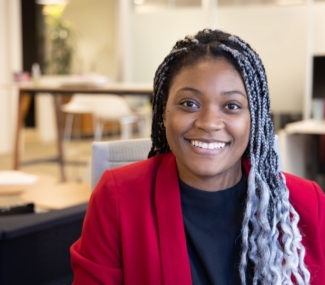How Gen Z Communicates Today Impacts How it Leads Tomorrow

Today we live in a world where in-person interactions are optional and what people want correlates to development in their personal lives. These shifts have occurred rapidly. As a 25-year-old, I entered the workforce post-COVID to a very different environment than the one I heard about prior to graduating college. Some of these changes can be directly tied to the pandemic, which altered how most new college graduates viewed the working environment. Others follow the continual trends from previous generations around career mobility, working from home, “side hustles,” and an increase in the percentage of working parents. We can see the impact of these shifts in how we communicate as a society. Gen Z, born between 1997 and 2012, is at the forefront of this transition.
Gen Z Communication Reflects the Times
Gen Z and the generations that follow us are in a space where things do not seem guaranteed. We have grown up with constant negative predictions on the health of the planet, global economic stability, and the failure of individuals, groups, and organizations. Our use of language has moved equally rapidly, with social issues, social media, and technology shaping the way we communicate. My generation was born in an information age with the ability to constantly communicate with anyone around the world, both in our personal and professional lives, and using the same tools and channels for work and non-work activities means we are constantly navigating the differences between personal and professional communication.
The Rapid Technology Shift Within My Generation
As an “older” Gen Zer, born in 1998, I remember a time before Apple released its iPhone, when I used my purple Nano to download music from the iTunes store. My school had computer carts, and teachers would “rent” laptops so we could conduct research. Younger Gen Z members, born around the time of the iPhone5 release, found these devices in their hands as toddlers as their parents sought to occupy them. These now-teenagers cannot recall a time without a computer in their hands. Our society has largely followed suit: many people spend large portions of time on their phone, taking work calls and dealing with business but also watching and sharing videos and just “hanging out.”
The Proliferation of Communication Platforms
As computing power has increased, platforms have proliferated. The speed at which we communicate to keep up has intensified. We increasingly message on short-form platforms like Teams, Slack, and WhatsApp for faster communication, writing in shorthand. Often emojis are answer enough, and GIFs are acceptable communication among peers. Starting messages with “Dear” and ending them with “Best Regards” has gone by the wayside with traditional formal emails, extensive manual research, and traditional 9-5 work.
Enter AI
As if technology changes, platform proliferation, and a Pandemic were not enough in one generation, now we have AI. Already, AI technology is taking some of the guess work out of research and provides sources much faster and with more accuracy than an individual can collect. AI can analyze findings and pull useful information for projects, potentially being able to create original research reports. My current role as a research associate might not be viewed the same way in a few years. That will be something new to handle.
The Implications of Rapid Communication Change on Gen Z
Growing up with hypoconnectivity increased the consumption of information that gave way to social trends like “cancel culture” and ethical consumerism. We see companies and individuals called out on a regular basis for actions overlooked not so many years ago, and we see band-aid initiatives not being enough to address topics like DEI&A and work/life balance. We have watched companies and organizations reevaluate their practices to appeal to a similarly adapting public. As we witness companies shift their communications in the face of forces and anti-forces, we find ourselves with a level of adaptability that differs from previous generations. Our reactions to these shifts are second nature.
Gen Z’s Leadership and Communication Training Has Already Begun
With all the rapid, life-altering change Gen Z has experienced in our 11-to-26 years, what will Gen Z leadership look like in the years to come? How will we communicate? While change is part of every generation and each brings something new to the work environment, Gen Z’s experience has uniquely shaped us to lean into the change and adapt our communications to match. Regardless, we will need to consider both the communications we see from the leaders who come before us and the workforce, Gen Alpha and beyond, we will lead.
Learning from Current Leaders
How current leaders contend with and communicate policy and practice changes over the next few decades determines the set of questions Gen Z will face. Today’s leaders face a much more complex set of questions than their predecessors: How and where should people work? What does work-life balance look like? What about when that balance intersects with self-care and freedom of expression? In the next ten years, leaders will likely grapple with questions we see bubbling up already: humans versus machines, interpersonal and in-person interactions, the impacts of screen time, and adjusting to a new vocabulary. As these issues evolve, Gen Z, as leaders, will evaluate today’s decisions and the corresponding communications as guideposts.
The Workforce Gen Z Can Expect to Lead
With social media here to stay, companies have found ways to interact with consumers at a much younger age. Young people have access to more information at the touch of their fingers and can learn about the world beyond what a school’s curriculum provides. That quest for knowledge and information is so woven into the growth and development of digital-native generations, that what are considered credible sources and how information is accessed and digested will be different.
The digital age will only continue to provide new ways to consume media, learn about different previously unconventional and taboo topics, and access it all at a much younger age than previous generations. How next generations approach the workforce will reflect this, and workforce staples like training will need to adapt.
How Will Gen Z Leaders Communicate?
Gen Z’s native understanding of how the modern world works will influence our leadership, and, in turn, our communication style immensely. As we become leaders, board members, and majority consumers, we will likely see a shift in how business adapt to address broader societal needs, like health care and childcare and belonging, perhaps addressing more squarely the root cause of issues than just the symptoms. What we know from our own internal conversations at Toffler Associates, if we become the leaders we want today, our communication will include:
- Listening
- Acting from a place of genuine concern
- Providing honest and transparent feedback
- Creating spaces for conversations that can lead to positive change
- Taking immediate short-term actions when something is not right or not working
- Understanding different generational norms
These ideals are a lot to live up to. As today, our policies and communications will not satisfy everyone. However, Gen Z characterized by its tolerance, meaning the stretch of inclusivity will not be as far. Regardless, as future leaders, we anticipate adapting to change reflexively and shaping workplaces in ways that teach and foster community differently than leaders today operate.
Gen Z hears and learns from so many platforms, and, when we become the leaders of companies and organizations, our influence will be from a wider range of ages, belief systems, and geographical locations than ever before. We will do our best with the state of the world in which it is passed to us, and, I believe, disrupt the status quo often as we bridge the traditional and new ways of working.


 About the Authors
About the Authors